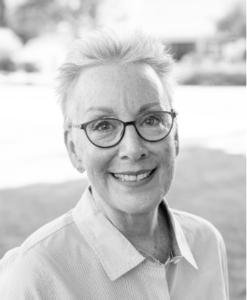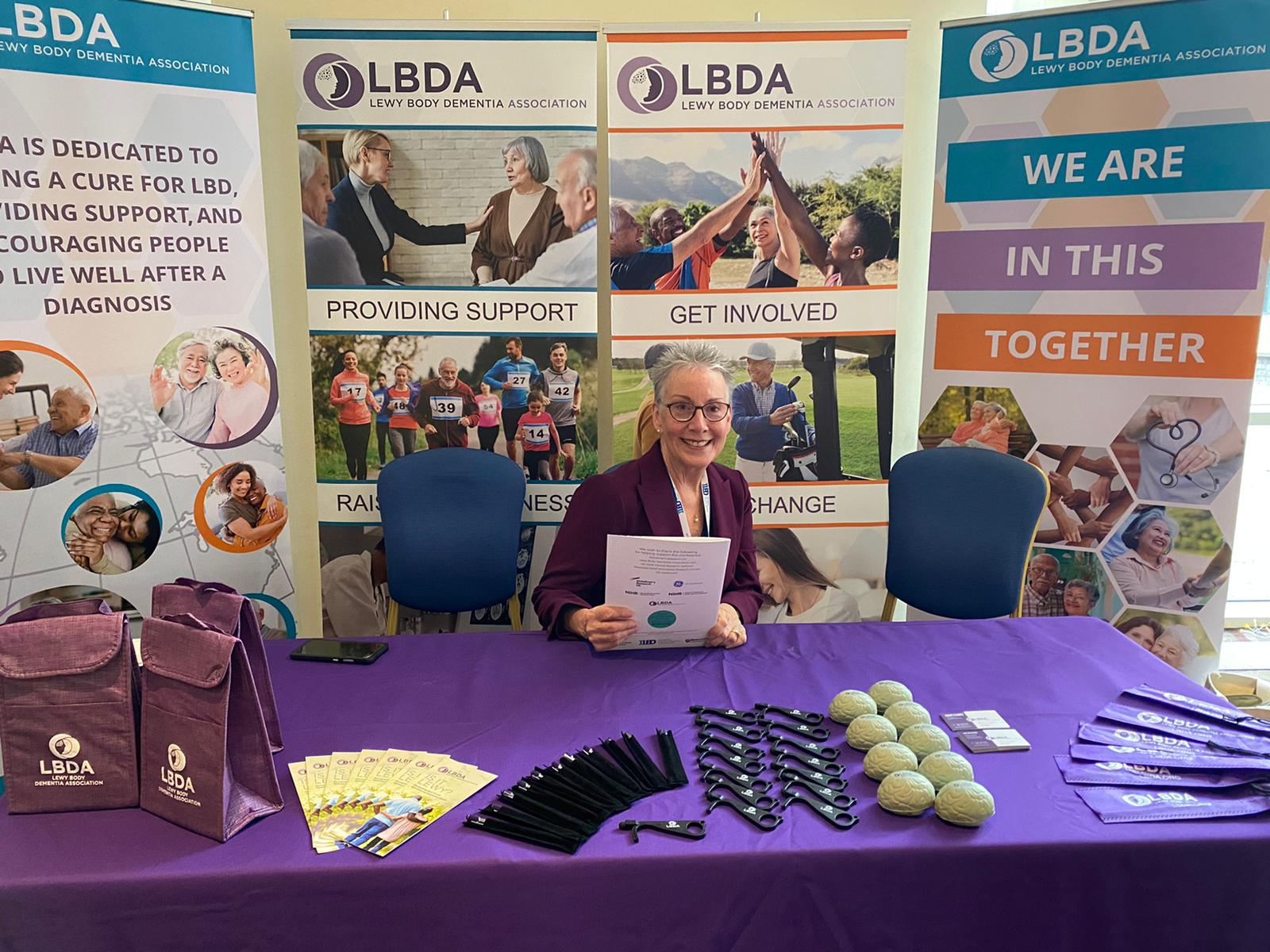An interview with Helen B. Medsger from the North Bay Lewy Body Dementia Support Group on October 4, 2023 by George Ackerman, Ph.D, J.D.

Biography
For over 30 years, Helen was the primary caregiver and health care advocate for two generations of her family who were diagnosed with Parkinson’s Disease with Lewy Body Dementia. Three members of her family have succumbed to the disease: her father, sister, and youngest brother.
In addition to being the facilitator of the North Bay Lewy Body Dementia Support Group serving the Wine Country north of San Francisco, she is a support services volunteer for the Lewy Body Dementia Association (LBDA), a trained LBD caregiver peer mentor, a member of the University of California San Francisco (UCSF) Memory & Aging Center’s Family Advisory Council, and the former LBD consultant to UCSF’s Care Ecosystem Study, a member of the Lived Experience Group at the Global Brain Health Institute, and a speaker for various organizations on the topic of caregiving. In the Fall of 2021, she was federally appointed one of two caregiver representatives to the Advisory Council on Alzheimer’s Research, Care, and Services under the U.S. Dept. of Health and Human Services making recommendations to the HHS Secretary and Congress and was named the LBDA 2022 Volunteer of the Year.
Helen is committed to improving the lives of persons with dementia and their care partners and is a staunch advocate for and active participant in neurodegenerative disease and genetic research. To elevate involvement of those with lived experience of dementia in research development, she sits as the Public and Patient Involvement (PPI) Chair of the International Society to Advance Alzheimer’s Research and Treatment Professional Interest Area (ISTAART PIA): Partnering with Research Participants.
Please tell me a little about your background.
I’m retired from a professional career in administration which took me from directing HR and administrative services of a large nonprofit organization to managing all internal systems and personnel in a CPA firm. My work and personal life have required frequent adjustment over the past 35 years, as I have had 3 first degree relatives who lived with Lewy Body Dementia (father, sister, youngest brother), two of whom I was primary caregiver for; my father and my sister. In addition, as a child, my mother was brain damaged, so her care also required management. For the past 8 years, I have been actively involved in community outreach and support for caregivers of and those living with Lewy Body Dementia and other Parkinsonian syndromes. I am now a global advocate.
Can you tell me more about your advocacy?
In 2015, I became a member of an advisory committee begun at the University of California, San Francisco Memory & Aging Center (MAC) known as the Family Advisory Council. We were 13 caregivers, handpicked by clinicians and staff of the MAC representing various dementias who were selected to advise staff on a study known as the Care Ecosystem (I was the only LBD rep). That began my journey in advocacy which now encompasses training and advising global research fellows on projects related to brain health and dementia through the Global Brain Health Institute Lived Experience Group. More recently, in 2021, the Lewy Body Dementia Association put forth my nomination and I was appointed as one of two caregiver representatives on the NAPA Advisory Council on Alzheimer’s Research, Care, and Services under the U.S. Dept. of Health and Human Services. My advocacy now extends globally as I am the PPI Chair of the ISTAART PIA: Partnering with Research Participants, all professionals working to have individuals living with a diagnosis, those caring for someone living with, and persons at risk of a dementia embedded in the research cycle, not just as participants, but as active members of the research development team, it’s known as PPI/PPV (Patient and Public Involvement/Voice). Some call us Citizen Scientists.
What is your passion and how did you get involved in Lewy Body dementia awareness and hope for a cure?
Having 3 first degree relatives who have succumbed to the disease drives my hope for a cure and my participation in research, but my caregiving journey fuels my passion to raise awareness of the disease and the needs of those living with it and their caregivers. My personal experience with my father and my sister ran the gamut of challenges from what I call the “dark ages of Lewy” and “five years of crisis management” to a deep understanding that early diagnosis, education, and training, and most importantly, support, can make a profound difference in the quality of life of someone living with or caring for the disease. My sister’s journey, beginning 6 years after my father’s ended, was informed and I became a partner with her, the clinicians and the researchers to improve her quality of life, every day. It was those lessons that I continue to share with the community, both families affected and with researchers. My involvement and commitment to the LBDA began when they were a fledgling organization and continues, today, by my being a caregiver support group facilitator, support services volunteer, and public speaker on their behalf.
What type of goals do individuals with Lewy Body dementia have when working with you?
Starting out, many have no idea of the questions, they don’t know what they don’t know when being diagnosed with a disease that so many have never heard of and have little understanding of (even health care providers). We set the goals together: understanding the symptoms and options for management, how to be an advocate with one’s providers and health systems, how to access services and support, and, most importantly, how to live each day with purpose and quality.
What type of training and how long are the programs?
When dealing with an individual who has LBD, I work one-on-one with them mostly over the phone or Zoom. On occasion, if they live nearby, I will do face-to-face sessions with them and/or their family members to educate them, provide resource information, and answer their most pressing questions. I have prepared PowerPoint presentations and been involved in the production of educational videos and podcasts both for organizations and university medical centers, which are also shared with families.
What effect can your advocacy have on an individual with Lewy Body dementia?
On an individual level, by informing and supporting them, I’m empowering them to be their own best advocate and to live the best life possible. On a broader scale, I’m advocating with researchers, health care providers, and government agencies to further their understanding of the needs of these individuals and the families and/or friends who care for them. I’m actively involved in 3 NAPA subcommittees: Research, Clinical Care, and Long-term Support Services and I know that research dollars have increased 7-fold over the past several years due to my advocacy and certainly those that preceded me and who are currently active.
What would you like to see as a future goal for your advocacy?
For now, my primary goal is to continue to inform and empower families. My secondary goal is to broaden my network and net-weaving of global advocates, so that we can reduce stigma and increase awareness of dementia for those residing not only in our own counties, but for those in low- and middle- income countries (LMIC).
What events do you participate in?
It varies widely: fundraising walks, promoting documentaries about dementia, speaking at LBD and other dementia conferences, and within the past two years, international research conferences. Next year, I plan to be in Spain on the Walking the Talk for Dementia. (I have also co-authored research papers.)
How does your advocacy also assist the caregivers?
When someone receives a diagnosis of a progressive neurodegenerative disease, it affects the entire family. So, when I interact with an individual, it’s essential that the support system be involved at some point. Most recently, I was in Washington, DC, when CMS announced a first-ever, wrap-around care model known as GUIDE for those with dementia and their caregivers. It will directly benefit the person living-with and also provide education, training, and support for caregivers. This is one of the best examples of what advocacy can produce. Globally, I recently reviewed and commented on papers for the World Health Organization and the International Neuropalliative Care Society providing input so that the needs of the caregivers were focused upon in the document.
How can someone get in touch? What is your website?
How can others also become advocates for awareness?
Lewy body dementia is known as the most common disease you’ve never heard of. So, they can start small, one-to-one, via word of mouth (I carried LBDA brochures in my car and would hand them out). You start with your family and friends, then the network of health care providers, other professionals that they may engage with, and graduate from there. Consider becoming a volunteer for the Lewy Body Dementia Association, host an awareness event in your community, there are numerous ways.
What is the best advice you ever received from a clinician?
“The best medicine for your loved one is to keep them physically and socially engaged.” (Boy, did we take that to heart.)
In your opinion what is the key to effective advocacy?
Never stop learning about the disease, follow disease-specific organizations and research, essentially stay informed and don’t be afraid to ask questions and do not be afraid to participate when opportunities come your way, every voice is needed.
If you had one final statement or quote you could leave for the Lewy Body dementia community, what would it be?
Your life is not over upon diagnosis, it’s just beginning a new chapter. Pages that you can fill with experiences, continued purpose, and moments of joy to treasure.

